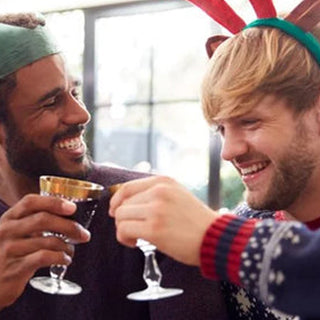Christmas is knocking on your door and the New Years is right around the corner! But instead of the typical festive cheer it brings to most, an air of uncertainty surrounds you, filling you with suffocating anxiety, dread and maybe even guilt. The social anxiety surrounding obligatory family reunions, those pestering questions, passive aggressive and sometimes straight-up judgemental remarks, financial stresses, made even worse if you’re queer with families and relatives who aren’t so welcoming or don’t know about your sexuality. It can also be an extremely lonely and isolating time for those without family to go home to or have moved abroad.
For many of us who make the trip home to see family, feelings of guilt begin to surface around holidays like these due to us resenting and not wanting to spend time with them because of the stigma and judgement we are bound to face at family holiday gatherings. For those who don’t and end up celebrating with friends or are looking for others to celebrate with, it can still be difficult for queer folks especially since a lot of queer events and folks tend to use substances to celebrate these festivities (which is far from the healthiest thing one should be doing for their mental health), making it an even more isolating experience for those of us who opt out of it.
Here are a few things you could keep in mind to help you through these tough holiday seasons a little better:

1. Embrace Yourself
Love yourself and know your value, feel confident in being you and that you’re representing yourself when showing up for these family gatherings. Not feeling fully seen or accepted by your family and relatives make it difficult to feel loved, which is why self-love is even more important. If you’re open about your sexuality and you have relatives questioning you about it, you can offer clarifications in a calm and measured tone, without instigating a fight. Politely and confidently stand up for who you are. However, not everyone has the privilege of disclosing your true identity to your family who may be less than supportive and it is understandable if you’re forced to ‘play along’ instead. The decision of how and when to come out is a personal one after all, and often times involve both a combination of the right time, space and circumstances to prep the conversation, process information and to educate.
2. Evaluate the Makeup of the Group
Is there a relative or a sibling who knows about your sexuality and is both accepting and supportive of you, or maybe it’s someone you enjoy spending your time with? These people could be an anchor for you when things at the gathering might stray a little or if tensions rise. Diffusing your hurt, anger, or sadness can alleviate your pains momentarily so that you can return to the table of the heat of the events to continue to engage.

3. Set Boundaries
If your family members start to engage in toxic or offensive behaviours, take a short breather from them to clear your mind. Remind yourself to not overindulge in drinking or substances that may affect your ability to remain calm or might result in a bad comedown, leaving you feeling far worse. If tensions are high, consider staying at a hotel or a friend’s place the next time, and maybe even attending only part of the event or dinner as opposed to sitting through the whole thing. If family reunions are often tensed or awkward for you, you could ask to bring a friend who can support or defend you if needed. Having your own space to do some self-care whether it’s going for an evening run outside or having a room to read your own books as an ‘escape’ could go a long way during these particularly stressful and socially draining times. Consider what sort of media leaves you feeling reassured, amused, or engaged, your imagination is one of your best companions especially in isolation.
4. Stay in Touch with Affirming People and Spaces
Talk to your friends about your holiday plans and talk with them beforehand about staying in touch. Some of your friends might be spending their holidays feeling lonely while some might be having just-as-stressful periods as you, check-in on each other and watch out for one another, you might end up finding some refuge amongst each other. If you’re seeing a counsellor or a therapist, you could schedule virtual sessions during these times as well.

5. Make New Traditions with Friends and Loved Ones
Many queer people experience our greatest love in our family of choice, those that we’ve forged such close-knit connections with through life. Holidays are the perfect time to plan a festive get-together with your favourite people and make some traditions of your own, whether it’s on the day itself of one of the other days around the period. Making time to be with people who fully accept you can help alleviate some of the stresses of being around less accepting and traditional family members.
It might also be a great time at forging new friendships with people both near and far, the online world makes it so much easier to meet and connect with souls from all around. You might end up meeting some people from across the pond who not only resonate with you so much, but also are spending the holidays alone.
Stay mindful and keep being you! Don’t forget you are always loved and don’t be afraid to reach out for help. We hope this article gives you a little nudge in the right direction this holiday season and for many more to come!
-----
blog by Bernard Yap




